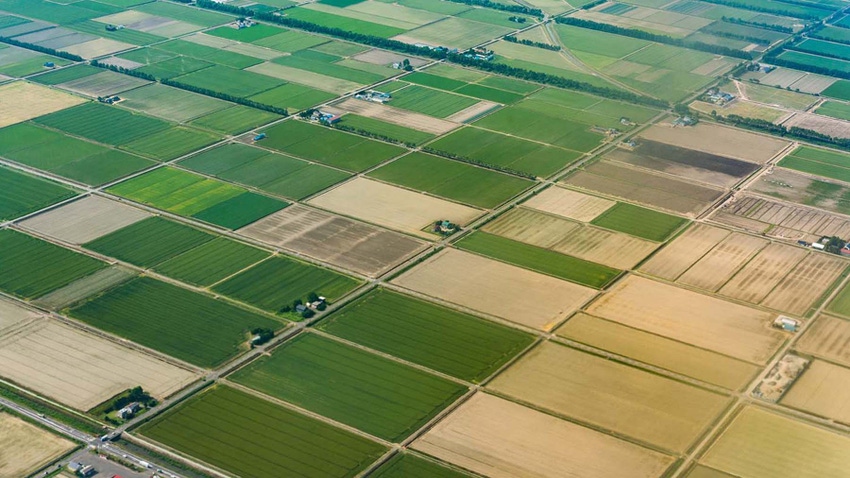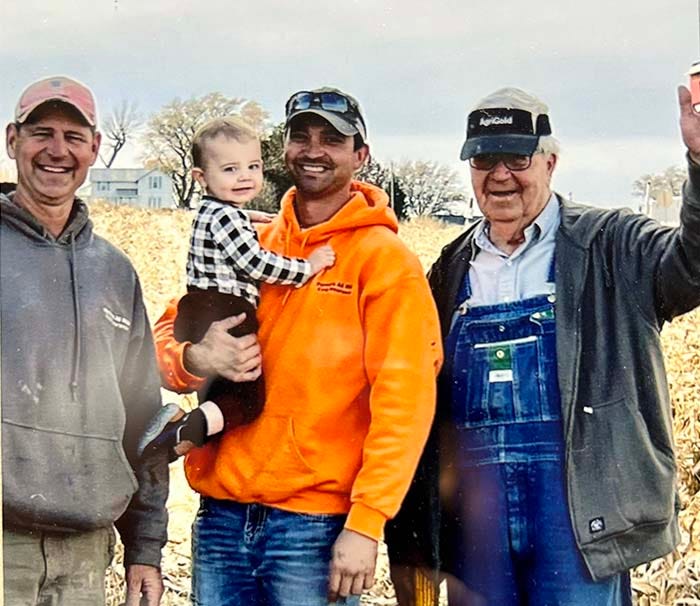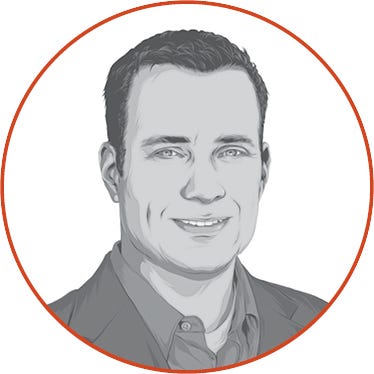
Pictured below are Ron, Todd, and Colton Dunphy, and perhaps a future 7th-generation farmer too. The Dunphys farm in Union County, Iowa and a few years ago received a conservation legacy award from their local conservation office. Attending this event was then sitting Secretary of Agriculture, Bill Northey, who asked Colton, “What do you think is the biggest challenge facing family farms?”

The Dunphy family. Credit: Colton Dunphy
We all know farming can be difficult. It can also be very rewarding. Climate change, drought, floods, disease, volatile market prices, and high costs of production. These are all challenges family farms face. Colton, however, responded to Secretary Northey with a larger viewpoint: “How to disincentivize out-of-state big money and fund-managed money, because it’s ruining family farms. We need to get more land in the hands of young producers and small family farms who will care for it - as we depend on it.”
Elliott Henderson, a former Army Ranger and young producer, says 27,000 acres in his home of Buchanan County, Iowa are owned by people who don’t live in the state of Iowa. He says that’s likely over $10 million of income which will not support Buchanan County. Elliott comments, “If we’re not careful, we’ll turn into how Europe was 200 years ago and be like peasants who farm and provide for the wealthy.”
In all fairness, not all absentee landowners are bad eggs. Colton acknowledges this too. In fact, my introduction to Colton was by way of one of his landlords from California. Like the Dunphys, this landowner is very conservation-minded and her decisions are driven by the stewardship of the farm first, then income. To Elliott’s point though, she��’s likely to not spend a lot of her farm income in rural Union County since she lives out of state.
This topic is a controversial one, but a real conversation I’m hearing out in the countryside. I was not at the field day to witness Secretary Northey’s reaction to Colton’s answer, but perhaps more government leaders need to acknowledge these trends and discuss potential changes, if any.
Penalizing non-resident owners
Colton offered the solution of some type of “land tax” on non-resident owners, but I’m guessing a lot of absentee landowners may feel they already pay their fair share of property taxes. Alternatively, he offered the idea of an “incentive” for resident owner-operators.
Elliott concurs. He believes all agricultural land should be taxed at commercial rates. However, if you qualify as an owner-operator similar to the USDA definition, then you get an exemption and pay taxes at the current lower agricultural rates. To boot, if you sell to someone who meets these same criteria it also exempts a landowner from paying any capital gains from the sale of the farm.
Tim Keegan, a young producer from Linn County, Iowa, says he’s ok with investors owning land, “as long they care for the land like we do.” Farmers are required to follow a conservation plan to be eligible to receive federal subsidies. He believes landowners should be held accountable too and have a responsibility to maintain the land for the next generation as we can’t produce any more of it.
Like it or not, one of the key characteristics of future farm producers may be how strong their relationships are with the buyers of farmland and future inheritors. One of the challenges I see is the educational gap that occurs between the current generation who owns farmland and the next generation who are more removed from agriculture.
This is one of the reasons two Iowa farmers, Glen Moeller and Steve Bohr, founded Next Gen Ag Advocates. Next Gen facilitates a matching program to match young and aspiring producers to retiring farmers without a successor, and also helps educate and provide unbiased information to those in the next generation (full transparency, I am also a co-owner).
Glen retired in 2015 after 40 years of farming and likes to think big, too. He says, “If we continue to lose small American family farms this could raise concerns about food security.”
Outside land ownership may not be as much of a threat in one place as another, either. Steve farms in Washington County, Iowa, and sees only a limited number of people who can afford the high capital requirements to farm. Steve says, “I personally don’t think outside money is any more of a threat than inside big money. Either way big money always beats little money. But, we need more of those with little money in agriculture.”
Downey has been helping farmers and landowners for the last 23 years with their family farm transition, estate planning, leasing strategies, and general farm advising. He is the co-owner of Next Gen Ag Advocates and an associate of Farm Financial Strategies. Reach Mike at [email protected].
About the Author(s)
You May Also Like






